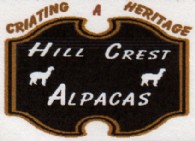Southcoast Today 2007
Dartmouth Woman Finds Serenity with Alpacas
Posted Jun 12, 2007 at 12:01 AM
After 30 years spent running a convenience store, Shirley Lanouette knew all about stress. Then her
life took an unexpected turn. While watching TV one evening almost five years ago, she became
intrigued by a commercial promoting the benefits of raising alpacas as a lifestyle alternative.
After 30 years spent running a convenience store, Shirley Lanouette knew all about stress.
“Always on call, 24-7,” she said. “I had bosses to please and people under me who were unhappy. It
got to the point that my husband just said, ‘You know you have to leave.’ ”
Then her life took an unexpected turn. While watching TV one evening almost five years ago, she
became intrigued by a commercial promoting the benefits of raising alpacas as a lifestyle
alternative.
Along with her husband, Roger, she began to do some research on these gentle domesticated
creatures. Highly prized for their fleece, which is lighter, silkier and warmer than wool, alpacas
have spread far beyond their Andean homeland. There are now hundreds of thousands of these animals
scattered on farms throughout the United States.
The Dartmouth couple began to frequent auctions and fairs, learning all they could about raising
and breeding these sociable herd animals. After considerable deliberation, the two eventually
visited a farm in Millis and bought their first alpaca.
“I lived in Dartmouth all my life and we always had some kind of animals around — a horse, a
cow, pigs, chickens. I told Roger, ‘We can do this,’ ” Ms. Lanouette said.
That was more than two years ago, and since then they have acquired four mature females, one of
which recently produced the very first baby born on their Old Fall River Road farm.
“They only have one baby a year. It’s an 11-months gestation,” Ms. Lanouette said.
The baby’s arrival caused great excitement. “I didn’t know anything about delivery, but Shelley
Riley of Golden Touch (Farm) in Westport was a godsend,” she said.
Ms. Riley, who also keeps alpacas, came to assist with the birth of the new arrival, a female named
Tiffany. Another female, Emma, is due to give birth any time now.
The Lanouettes are not concerned by the increasing numbers. They have found alpacas so easy to keep
that they hope to continue expanding the herd.
“An acre will easily support 10 animals. They are ruminants, so their diet consists mainly of grass
and hay supplemented by some grain,” Ms. Lanouette said. “They only have two bottom teeth, so they
don’t tear grass out by the roots like sheep and goats.”
Not being well-equipped to defend themselves, however, leaves the animals vulnerable to predators.
Both coyotes and dogs are known to attack alpacas.
Alpacas are sheared once each year, generally in May, and “the blanket” can yield anywhere from 6
to 10 pounds of fleece. The yarn spun from the fleece can fetch from $4 to $6 an ounce.
A spinning wheel now stands in the back yard and Ms. Lanouette proudly displays socks and a scarf
she has made from the fleece of her own animals.
The alpacas wandering serenely around the pasture behind her house reflect the peace she has found
in her own life since walking away from the mayhem of the business world.
“For years, it was just one big juggling act, and it seemed like I was always torn,” she said. “I
like
this much better.”
June 30, 2017
